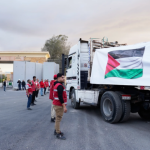
Kolkata’s market and hotel business collapses due to Bangladeshi buyer shortage
The markets and hotels in Kolkata, India, used to be bustling with Bangladeshi buyers. After the change of power in Bangladesh due to the student-public movement, India restricted visa activities and business in Kolkata has collapsed. Local businesses in Kolkata, which depend on Bangladeshi tourists, are also going through a difficult time.
Visa centers are now only giving limited slots for emergency medical and student visas. As a result, those who used to travel to India for tourism or various purposes are in trouble.
Hotels in the areas of Kolkata where Bangladeshis go to stay are ‘khan-khan’. Businesses are facing a customer crisis. The situation has become such that local businessmen are reminded of the days of travel bans and strict restrictions during the Covid pandemic.
The Times of India has reported that such a situation has been going on in some areas of Kolkata since the mass movement in Bangladesh in July-August.
Many of those who travel to Kolkata from Bangladesh for various purposes stay in hotels in Marquis Street, Kidd Street, Esplanade and New Market areas. The businessmen there are largely dependent on Bangladeshi tourists. That is why various small businesses, starting from money exchange, tour guides, visa assistance centers, bus-train-airplane ticket booking agencies and hotels, restaurants, have been established in those areas.
The Times of India wrote that more than a hundred hotels and more than 3,000 shops in the two square kilometer area of Central Kolkata depend heavily on Bangladeshi people. But in the last few months, as Bangladeshi travel has completely decreased, business there has decreased by 70 percent.
Monotosh Sarkar, executive member of the Kolkata Hotel and Restaurant Owners Association, said, “Since July, only four-five of the 30 rooms in my hotel on Marquis Street are occupied by people. Before the student movement and Sheikh Hasina left the country, the hotel had 26-28 guests.
“Many small hotels with a dozen rooms had to be temporarily closed because it was not possible to run the hotel with a couple of customers.”
He added, “The situation has become such that it seems that we are going through the Covid-19 period in 2021, when there was a travel ban.”
From January to June of this year, Bangladeshis were the largest number of tourists traveling to India. But the situation changed from July. When a curfew was imposed after violence over the quota reform movement, Indian visa application centers were closed from July 18. After that, the centers continued to be closed with daily announcements.
After the fall of the Sheikh Hasina government on August 5 in the face of mass protests, visa application centers were declared closed indefinitely due to unstable conditions.
In an announcement two days after the fall of the government, the Indian Visa Application Center (IVAC) said, “Due to the unstable situation, all IVACs will remain closed until further notice. The next application date will be communicated via SMS and you are requested to collect your passport on the next working day.
Complex patients in trouble after not getting Indian visas
Visa application centers were opened on a limited scale in the middle of that month. Then on August 16, Indian Foreign Ministry spokesperson Randhir Jaiswal said that the Indian High Commission in Dhaka would issue only emergency and medical visas on a limited scale until the situation normalized.
Visa applicants protested at various centers including Jamuna Future Park in Dhaka to get their passports back. The Jamuna Future Park and Satkhira visa application centers were then closed citing security reasons.
On September 3, 13 out of 16 visa application centers were opened only to return passports. From September 22, visa application centers in Dhaka, Chittagong, Sylhet, Khulna, Satkhira, Noakhali, Mymensingh, Barisal, Thakurgaon, Comilla, Rangpur and Rajshahi started working on a limited scale.
On September 29, the Indian media outlet The Print reported that the High Commission had returned 20,000 passports to Bangladeshi nationals during this period due to ‘protests and threats to the High Commission’.
In a statement on September 26, the IVAC said that IVACs at five locations in Dhaka, Chittagong, Rajshahi, Sylhet and Khulna have started providing limited appointment slots to Bangladeshi nationals for emergency medical and student visas.
All Indian visa application centres in Bangladesh have been closed
The statement said, ‘These services will remain limited until IVAC resumes its normal operations at a later date.’
A resident of Chattogram, Rezen Biswas, told the Times of India at a deserted Kolkata hotel, ‘Since the mass movement, the presence of Bangladeshis in Kolkata has come down drastically due to the new strictness of the Indian government in issuing visas. I had a visa earlier, due to which I was able to come to Kolkata now. But now those who are applying for visas are not being given visas except for emergency medical treatment. Perhaps the Indian government has become stricter in visas due to the unstable situation in Bangladesh.’
They worry that if instability in Bangladesh continues for a few years and India remains so strict about visas, the small economies of those areas will collapse.
Most of the customers of the shop named ‘Choco Nut’, which sells chocolate, nuts and cosmetics in Kolkata’s New Market, are Bangladeshis. Before the mass movement in Bangladesh, that is, during normal times, their daily sales were 3.5 lakh rupees. However, now sales have come down to 35 thousand.
‘Choco Nut’ owner Md. Sahabuddin said, “Some of those who have come on medical visas are now coming to the shop. But those who buy products from New Market and sell them in Dhaka have completely stopped coming and going.”
Ajay Shaw, owner of cosmetics shop Royal Store, said, “Such a bad situation is not only in his 124-year-old shop, but in the entire New Market.”
“The face of this market has changed after the decrease in local customers around 2008-09. At that time, New Market became popular with Bangladeshis. Considering the demand of the buyers, almost all the shops started hosting them. But after the problems started in Bangladesh and due to visa complications, the number of buyers has decreased drastically.’
He said, ‘We used to get 25 to 30 customers a day, whose average purchase amount was 15 thousand. But now we don’t get even five Bangladeshi buyers a day. And their purchases have also decreased to 10 thousand.’






![Pakistan accuses the TTP of carrying out attacks on its territory and the Afghan Taliban government of harbouring the group [File: Fayaz Aziz/Reuters]](https://asiandiplomacy.com/wp-content/uploads/2025/10/2023-02-27T041341Z_1777986366_RC2O7Z9GI1FB_RTRMADP_3_PAKISTAN-BLAST-POLICE-1760256429-150x150.webp)